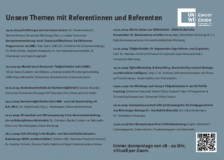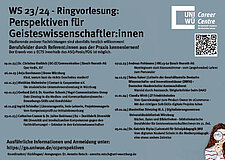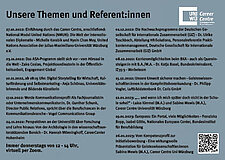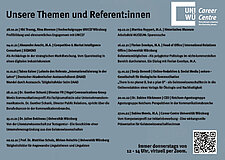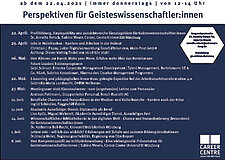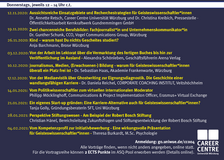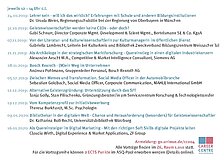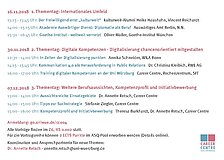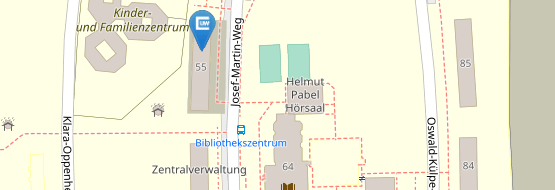Lecture series: Perspectives for Humanities
Humanities students talk about their own careers and exciting career prospects. The lectures take place online on Thursdays from 16:15 to 17:45 and are held in german. It is also possible to attend individual lectures. Interested parties who cannot register via WueStudy will receive the access link by e-mail. Please send us a short e-mail to career@uni-wuerzburg.de
Click here to register
Programme
And what will you do with it? This question is asked repeatedly to students of humanities subjects. To avoid responding with a helpless shrug and saying ‘something to do with media or culture,’ it is important to know your own skills and goals early on. Most jobs for humanities graduates are not advertised. However, there are still many opportunities to find jobs through personal contacts or unsolicited applications.
The lecture series introduces people who have taken this path themselves, some of whom now work in traditional fields for humanities scholars, while others are engaged in exciting activities in completely unexpected areas.
Due to advancing globalisation and digitalisation, the job market is not only undergoing increasingly rapid change, but is also being influenced by diverse and unpredictable crises.
The importance of interdisciplinary, transversal skills is constantly increasing in the job market. Therefore, the Career Centre is particularly keen to use this series of events not only to present future-oriented and interesting career fields and career paths, but also to show which programmes students can and should use to develop their skills with regard to the various career fields.
In this context, various certificate programmes will be presented at the event.
- Professional Skills Certificate - Career Centre
- Additional qualification in cultural mediation – Dr Christine Ott
- GSiK certificates: Intercultural competence and sustainability and global responsibility – Johanna Lawall
- Certificate programme on recognising and preventing abuse of power (MEV) – Prof. Dr Andrea Kübler
The traditional application process is undergoing significant change, moving away from the conventional procedure towards short applications, preliminary informal interviews, etc. In their presentation, the two speakers will discuss current developments and new methods in the field of people & culture, helping you to discover and discuss the innovations in the application process.
The second part of the presentation will then focus on the media and communications industry itself. Here, you will learn about possible career profiles in this field. In addition to the ‘classics,’ you will also learn about other career opportunities in the world of media and communications. True to the motto: ‘We live in the most communicative age in world history. Transformation is communication – it is the only way to create the future. And that requires professionals.’
What does a human resources development professional actually do – and how do you get there?
As diverse as people themselves, human resources development is much more than just organising seminars. Whether it's designing and implementing training courses, supporting managers, developing new learning formats, adapting competence models, designing feedback processes, further developing the learning culture or supporting change processes – every day brings new challenges.
What all these tasks have in common is the joy of making learning and development possible.
The presentation provides insights into a professional field that offers a wide range of creative possibilities and shows how you can successfully gain a foothold in it even without a traditional career plan. With practical experience and personal insights – for anyone interested in development: in others and in themselves.
We live in very dynamic times. Change seems to be the greatest constant in our lives. Transformation processes from various social perspectives, such as continuous technological developments, innovations and internationalisation, have a decisive influence on our professional lives. What distinguishes transformational leadership from transactional leadership? What factors influence the development of a corporate culture and an institutional culture? What types of motivation can successfully support change and transformation processes?
The lecture ‘Transformational Leadership’ addresses these contemporary issues.
Anja C. M. Schönau I Visual artist with a focus on social impact, sustainability and participation
When studying humanities, you often don't have a clear career path in mind. If you also want to save the world, things get complicated. Flexibility and a plan B (or C or D) are required. Instead of pursuing a doctorate in American studies, you might end up in the online editorial department of an eco-friendly publishing house, taking care of the website, newsletter, social media and much more.
Sonja Bonneß uses her own career path to explain why detours can be useful when choosing a career, why the humanities and a commitment to sustainability and climate justice go well together, and how books can make the world a little bit better. After studying American Studies, English and German, she initially worked at the Chair of American Studies at the University of Würzburg. After further training as a business manager and a lot of voluntary work in the eco-social sector, she finally ended up as a trainee at oekom Verlag and has since been using digital communication to inspire people to read books and magazines on ecology and sustainability.
As a ministry with a network of over 225 missions abroad, the Federal Foreign Office is Germany's voice in the world. The Federal Foreign Office is no ordinary employer, as the majority of its employees spend their entire working lives rotating between the headquarters in Berlin and the missions abroad. An exciting workplace and diverse development opportunities await you! Interested? Then we look forward to informing you personally about the career opportunities available!
Would you like to gain insight into the diverse career opportunities available at an NGO? In our presentation, you will receive exciting information about the recruitment process at Kindernothilfe as well as the tasks and requirements of our various jobs. Find out how you can specifically prepare for a career start in our industry. Join us and discover the opportunities for a meaningful job at one of Germany's largest children's rights organisations.
Climate protection is being implemented in a tangible and concrete manner at the local level. The consequences of advancing climate change are also already clearly noticeable at the local level.
The changed reality of life is generating motivation and pressure to take action to adapt.
The municipality – the city of Würzburg – plays a central role, or rather several roles, in this regard: as a role model, it takes care of the energy efficiency of its own properties; as a planner and regulator, it sets specific guidelines for climate-optimised construction; it is also a supplier of renewable energies through local public utilities; and it advises local people on issues such as energy-efficient renovation, adaptation to extreme heat or climate-friendly behaviour – and much more.
It is important to strategically manage and coordinate these issues, exploit synergies and generally integrate climate protection and climate adaptation into all areas of life and work (‘mainstreaming’). This is a multidisciplinary task. It is a task that requires cooperation between people from different professional fields – and can also offer exciting prospects for humanities scholars.
In order to submit a successful speculative application, it is important to research your desired employer and possible areas of work, but also to consider your own skills profile. The skills profile captures the current status of your skills acquisition. It highlights the knowledge, skills and abilities that you have acquired formally or informally. Skills acquisition may have taken place as part of your (academic) education, but also outside of school and university, and implies both theoretical knowledge and practical experience.
Requests for further lecture topics and cooperation requests for the coming semesters can be addressed to Dr Annette Retsch at any time:
annette.retsch@uni-wuerzburg.de, 0931/31-82420

